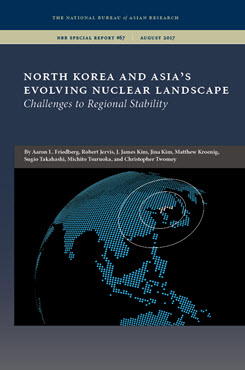Toward a Common Strategy for Deterring a Nuclear North Korea
This essay argues that the U.S. will need to work more closely with Japan and South Korea to develop a common and coherent deterrence strategy if Washington hopes to reliably deter North Korea and assure its East Asian allies.
EXECUTIVE SUMMARY
This essay argues that the U.S. will need to work more closely with Japan and South Korea to develop a common and coherent deterrence strategy if Washington hopes to reliably deter North Korea and assure its East Asian allies.
MAIN ARGUMENT
The primary objective of U.S. policy in North Korea must be the denuclearization and peaceful reunification of the Korean Peninsula, but until that goal is achieved Washington and its allies must work to deter and defend against the existing nuclear threat. During the Cold War, NATO’s nuclear deterrence strategy contained a number of core elements: a clear understanding of what the threat was and how the alliance would respond to the threat if deterrence failed, an explanation for why that response should outweigh the benefits of any aggression in the adversary’s calculation and what capabilities were required to make the response credible, and mechanisms for communicating that strategy within the alliance and to the adversary. In contrast, some of these elements are missing in East Asia at present. The U.S. and its Northeast Asian allies, South Korea and Japan, must rectify this situation to strengthen nuclear deterrence in the region. They should come to a common threat assessment and then proceed to formulate and articulate a clearer strategy for deterring a North Korean nuclear attack and nuclear coercion.
POLICY IMPLICATIONS
- If Washington, Tokyo, and Seoul wish to work toward a common deterrence strategy, they should begin by coming to a common understanding of the various threat scenarios posed by North Korea’s nuclear forces and how the allies would respond in these scenarios.
- In order to reliably deter Pyongyang, the U.S. and its allies must ensure that they have the capabilities to follow through on the planned response and have appropriate mechanisms for communicating this strategy both within allied governments and societies and to the North Korean leadership.
- The development of the key elements of a common strategy should begin within the strategic planning communities both inside and outside government in all three countries and only then move to higher levels of government for official deliberations.
Matthew Kroenig is an Associate Professor in the Department of Government and the Edmund A. Walsh School of Foreign Service at Georgetown University as well as a Senior Fellow in the Brent Scowcroft Center on International Security at the Atlantic Council.


